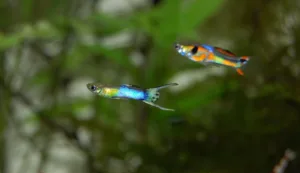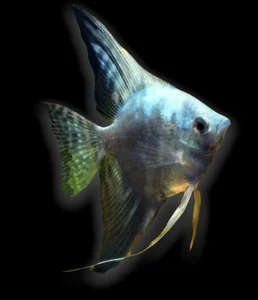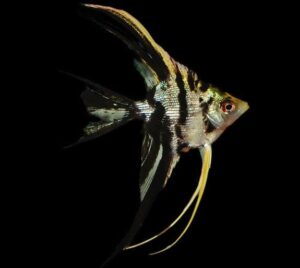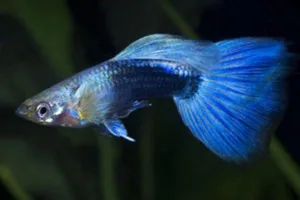The Red Flamingo Guppy is a color variation of the Poecilia reticulata guppy. It is known for its vibrant orange-red coloration, similar to its avian namesake. The Red Flamingo Guppy is a popular choice for aquarists of all experience levels, due to its hardy nature and relatively easy care requirements. In this Red Flamingo Guppy care guide we will explore, tank setup, feeding, breeding, disease and treatments and everything you need to know to take care of these tropical freshwater fish.
Origin
The Red Flamingo Guppy is a selectively bred color variation of the Poecilia reticulata guppy. It is not found in the wild, but was developed in captivity by aquarists through careful selective breeding. The exact origin of the Red Flamingo Guppy is unknown, but it is believed to have been developed in the early 2000s.
Guppies are native to northeastern South America, specifically Venezuela, Guyana, and Brazil. They were first introduced to Europe in the 1800s and quickly became popular aquarium fish. Guppies have since been introduced to all over the world and are now one of the most popular aquarium fish in existence.
Appearance
Male Red Flamingo Guppies are typically more brightly colored than females. They have a flamboyant orange-red body with contrasting white belly and fins. Their tails and fins are often elaborate, with intricate patterns and flowing extensions. Male Red Flamingo Guppies typically reach a size of around 1.5 to 2.5 inches (3.8 to 6.4 cm).

Female Red Flamingo Guppies are generally less colorful than males, with a more subdued red or orange coloration. They may also have some black or white markings on their bodies. Female Red Flamingo Guppies typically reach a size of around 2 to 3 inches (5.1 to 7.6 cm).
Size
Both male and female Red Flamingo Guppies can grow to be around 2 to 3 inches (5.1 to 7.6 cm) in length. However, males are typically a bit smaller than females. source: abyss aquatics
Red Flamingo Guppy Care Guide
Tank Setup
Tank Size and Requirements:
The best size tank for a Red Flamingo Guppy is a 10 gallon size tank if you have a group of less than 5 fish. If you plan on having more than 5 fish you should move up to a larger tank like a 20 gallon to 55 gallon tank. The larger the tank the easier it is to keep the water clean and clear.
Filtration
Water quality is the most important part of keeping fish in your Red Flamingo Guppies tank. A high-quality filtration system is one of the most important pieces of equipment you will buy. One of the best options is the Fluval Aquaclear Power Filter, known for its reliability and customizable filtration. Another excellent choice is the Eheim Classic External Canister Filter, its quiet operation and efficient mechanical and biological filtration.
Substrate Choices:
For substrate, consider choosing fine gravel, aqua soil or sand. These options are ideal as they are easy to clean, provide a natural appearance, and allow for the rooting of live plants. Brands like CaribSea Eco-Complete and Seachem Flourite Black Sand offer great options that are rich in essential minerals to support plant growth.
Plant Selection:
Adding live plants to your Red Flamingo Guppies tank not only creates a better visual effect but also contributes to a healthy ecosystem. Some of the best plant options include Java Moss, known for providing hiding spots and surfaces for beneficial microorganisms. Anacharis, often called the waterweed, is an excellent choice due to its fast growth and the fact that guppies enjoy nibbling on its fine leaves. Additionally, consider Hornwort, which not only provides shelter but also helps maintain water quality through its efficient nutrient uptake.
Heating Solutions:
A stable temperature is also important for the well-being of Red Flamingo Guppies. The Eheim Jager series is a well-regarded choice, known for its accuracy and durability. The Fluval Heater is another option, featuring a digital display for precise temperature control.
Steps for setting up your tank :
- Choose a location for your tank. The tank should be placed in a level spot where it will not receive direct sunlight.
- Clean the tank. Rinse the tank with water to remove any dust or debris. Do not use soap or detergent, as this can be harmful to fish.
- Add the substrate. Add a 2-3 inch layer of substrate to the bottom of the tank.
- Add the decorations. Rinse the decorations thoroughly before adding them to the tank. Be careful not to overcrowd the tank with decorations, as guppies need plenty of swimming space.
- Fill the tank with water. Use dechlorinated water to fill the tank. You can use a water conditioner to remove chlorine and other harmful chemicals from the water.
- Install the filter, heater, and air pump. Follow the manufacturer’s instructions to install the equipment.
- Cycle the tank. This involves establishing a colony of beneficial bacteria in the tank. The bacteria will help to break down fish waste and other toxins. To cycle the tank, add a small amount of fish food to the water every day for a week. Do not add any fish to the tank during this time.
- Test the water. Once the tank has cycled, test the water to make sure that the parameters are within the safe range for guppies. The ideal water temperature for guppies is 72-78 degrees Fahrenheit. The pH should be between 6.5 and 7.5.
- Add the guppies. Start by adding a few guppies to the tank and monitor them closely for any signs of stress. If the guppies seem to be doing well, you can add more fish to the tank gradually.
Once the tank has cycled, you can add your guppies. Start with a small number of fish and add more gradually over time.
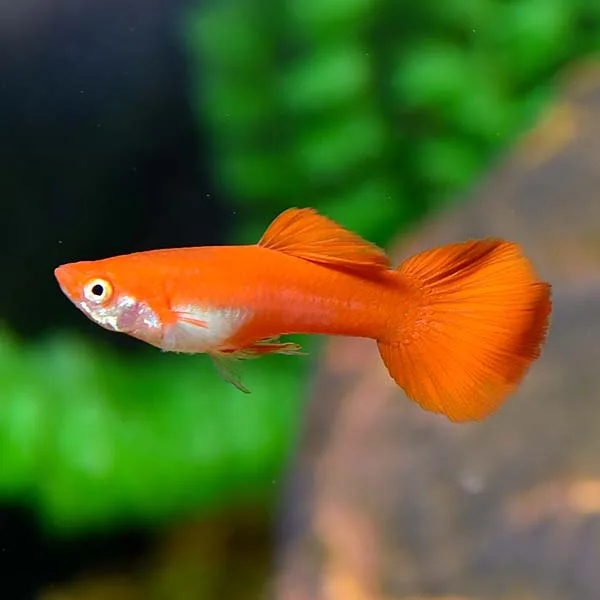
Feeding
Red Flamingo Guppies are omnivores and will eat a variety of foods, including flake food, live food, and frozen food. It is important to feed your guppies a high-quality diet to ensure that they stay healthy and keep good color.
A good feeding schedule for freshwater tropical fish is to feed them two to three times per day, small amounts at a time. You should avoid overfeeding your guppies, as this can lead to water quality problems.
- Wash your hands thoroughly with soap and water before feeding your fish.
- Measure out a small amount of food, about enough as your fish can eat in two minutes.
- Sprinkle the food over the surface of the water.
- Observe your fish eating to make sure all the fish are getting food and that they are not overeating.
- If there is any food left over after two minutes, remove it from the tank.
Guppies need a need a varied diet for optimal health and color. Here are some specific foods and brands to consider:
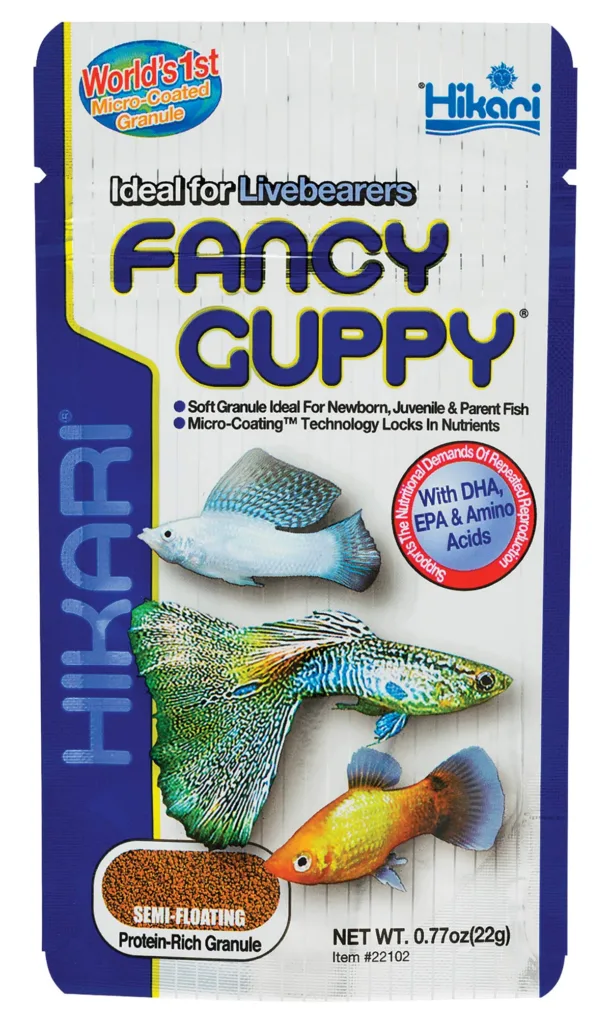
- High-Quality Flakes/Pellets: Look for guppy-specific flakes or pellets from reputable brands like Hikari and Omega One. These foods provide essential nutrients and promote coloration.
- Live and Frozen Foods: Guppies enjoy occasional treats like daphnia, brine shrimp, and bloodworms. Brands such as San Francisco Bay and Ocean Nutrition offer quality frozen foods.
- Vegetables: Supplement their diet with blanched vegetables like zucchini and spinach. These provide fiber and help prevent constipation.
- Feeding Schedule: Offer small portions 2-3 times a day, ensuring they consume the food within a few minutes to prevent overfeeding.
- Variety: Rotate between different types of food to provide a well-rounded diet and enhance their coloration.
Disease
Like all aquarium fish, Red Flamingo Guppies guppies can be susceptible to various diseases. Prevention and early detection are key to maintaining their health.
| Disease | Symptoms | Treatment and Prevention |
|---|---|---|
| Ich (White Spot) | White cysts on the skin and gills, flashing, rubbing against objects. | Increase temperature to 86-88°F (30-31°C) for a few days. Add aquarium salt. Quarantine new fish. Maintain good water quality. |
| Fin Rot | Tattered fins, inflammation, and discoloration. | Improve water quality. Treat with antibiotics if necessary. Maintain a clean tank and perform regular water changes. |
| Dropsy | Swollen abdomen, raised scales, and loss of appetite. | Quarantine affected fish. Provide antibiotic treatment as advised by a vet. Maintain good water quality. |
| Velvet Disease | Tiny gold or rust-colored spots on the skin. Scratching against objects. | Increase temperature and add copper-based medication. Quarantine affected fish. |
| Internal Parasites | Weight loss, bloated appearance, and abnormal feces. | Use anti-parasitic medications. Maintain a clean tank and ensure proper nutrition. Quarantine new fish before adding them to the tank. |
Regularly observe your Red Flamingo Guppies for any signs of illness and quarantine affected individuals promptly to prevent the spread of disease.
Here are some tips on how to prevent diseases in your Red Flamingo Guppies:
- Start with healthy fish. Avoid buying fish that are lethargic or have cloudy eyes.
- Quarantine new fish for two to three weeks before adding them to your main aquarium. This will help to prevent the spread of any diseases.
- Maintain good water quality. Perform regular water changes and clean the tank filter and heater regularly.
- Feed your fish a high-quality diet. Avoid overfeeding your fish, as this can lead to water quality problems.
- Monitor your fish regularly for signs of disease. If you notice any fish that are showing signs of disease, it is important to isolate them from the other fish and treat them immediately.
Tank Mates
Red Flamingo Guppies are peaceful fish that can be kept with other community fish of similar size and temperament. Some good tank mates for Red Flamingo Guppies include:
- Neon tetras
- Guppies
- Zebra danios
- Corydoras catfish
- Platies
- Swordtails
- Mollies
Breeding
Breeding Red Flamingo Guppies is relatively easy in captivity. If you are interested in breeding Red Flamingo Guppies, it is important to have a separate breeding tank. The breeding tank should be planted with floating plants to provide cover for the fry.
To breed Red Flamingo Guppies, simply place a male and female guppy in the breeding tank. The female will become pregnant within a few days. The gestation period for guppies is around 21 to 30 days.
Once the female guppy is pregnant, she will develop a dark spot on her abdomen. This spot is called the gravid spot and it is a sign that the female is close to giving birth.
When the female guppy is ready to give birth, she will isolate herself from the other fish. She will then give birth to live fry. The fry will be very small and will need to be fed a diet of infusoria or baby brine shrimp until they are large enough to eat regular food.
Here are some additional tips for breeding Red Flamingo Guppies:
- Use healthy and well-fed fish for breeding.
- Keep the breeding tank clean and well-maintained.
- Provide the fish with a variety of foods to ensure that they are getting the nutrients they need.
- Remove the male guppy from the breeding tank after the female has given birth.
- Feed the fry a diet of infusoria or baby brine shrimp until they are large enough to eat regular food.
Where to buy and average price
Red Flamingo Guppies can be purchased from a variety of sources, including:
- Local fish stores: This is a great option if you want to see the fish in person before you buy them. You can also ask the staff questions about the fish and their care requirements.
- Online fish retailers: This is a convenient option if you can’t find Red Flamingo Guppies at your local fish store. However, it is important to choose a reputable online retailer that offers healthy fish and a live arrival guarantee.
- Aquarium clubs and breeders: Aquarium clubs and breeders are often a great source of high-quality Red Flamingo Guppies. You can find aquarium clubs and breeders in your area by searching online or contacting your local fish store.
The average price of a Red Flamingo Guppy varies depending on the source and the quality of the fish. However, most Red Flamingo Guppies can be purchased for between $2 and $5 each from local store. If you are planning on purchasing from a breeder you can plan on spending $10-$25 per a fish.

